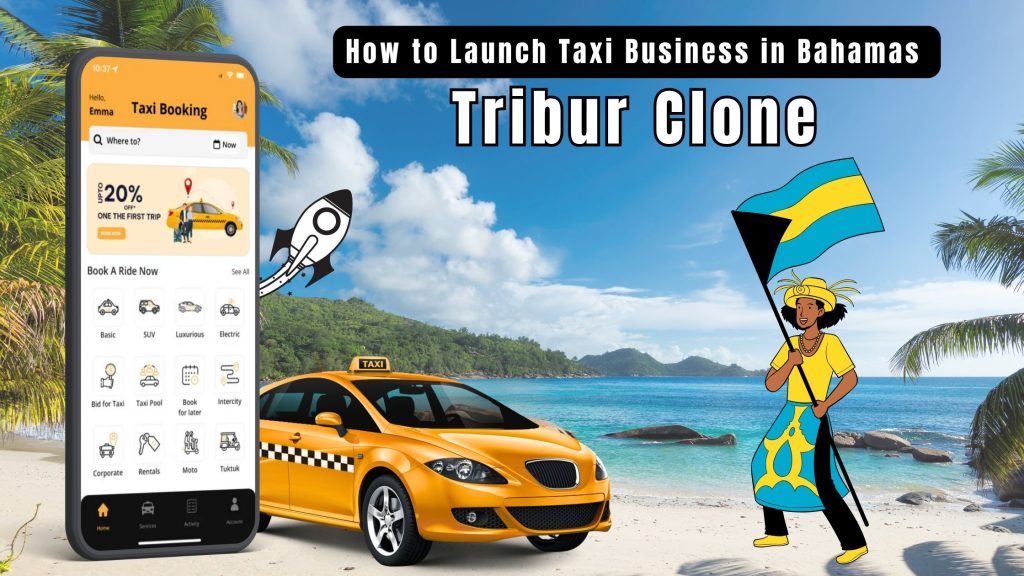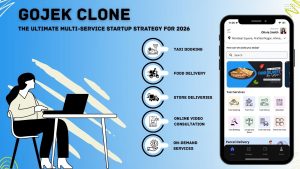
Many smart entrepreneurs are taking the big leap into the world of on demand mobile app based taxi booking solutions. With the quickly changing consumer behaviour on a global scale, it is only fair that the traditional taxi businesses can now be equipped with an app based solution to help them grow their business and establish their brand. The Tribur App Clone is one such example.
Tribur is a rideshare platform already operating in the Bahamas, designed to give passengers a smooth, app based experience. And if you’re an entrepreneur wanting to create something similar, a Tribur Clone App might just be your easiest, smartest entry point.
What’s a clone app, you ask? It’s a readymade, customizable solution built to mimic the structure and user experience of a successful app like Tribur, minus the months of development and massive budget. However, arming yourself with a decent ride share app is just the beginning, and in the famous words, ‘miles to go before we sleep’, there is a lot to understand in order to be able to establish a good business. Three of the most important points in our experience are market analysis, the app’s flow, and the common traps to avoid. Let’s walk through it all.
The Market Landscape of Taxi Businesses in the Bahamas
Starting a taxi business in the Bahamas isn’t just about convenience, it’s about tapping into a genuine, everyday need. For locals, ride hailing solves transportation gaps between neighbourhoods. For tourists, it’s a lifesaver, navigating unfamiliar roads, visiting multiple islands, or just getting to the airport without stress.
Unlike North America or Europe, where Uber and Lyft dominate, the Bahamas has space for home grown or local rideshare apps. That’s where your opportunity lies. The island geography, reliance on tourism, and limited public transport in many areas make a strong case for more rideshare platforms.
Also, let’s not forget that phone penetration is high, and tourists especially are more likely to download an app than flag down a taxi. That’s why the ridesharing model works so well here, on demand availability, location tracking, digital payments, and upfront fare estimation bring a level of trust and comfort that traditional taxis just can’t.
But this doesn’t mean you can just launch anything and expect results. Your app must be reliable, intuitive, and aligned with what Bahamian users expect. And that brings us to the heart of things: how a good Tribur Clone App should actually work.
Ideal Flow of the Tribur App Clone
Let’s break down the app flow, this is what your users (and drivers) will experience day to day. If your clone app doesn’t follow this intuitive pattern, it’ll only frustrate users.
Here’s what a solid ride hailing flow looks like:
- Downloading & Installing: When the user needs a ride sharing app like Tribur, he finds yours and downloads it from the Google Play store or the iOS app store depending on his device. Then installs the app on their device.
- Account Setup & Login: The next step is logging in which can be done seamlessly with either fingerprint recognition, face recognition, mobile number based OTP generation or email ID.
- Location Access & Booking Screen: The app asks for GPS permissions. Once granted, it auto detects the user’s current location. The user then types in the destination, which gives them route previews and fare estimates.
- Choosing a Vehicle Type: Whether it’s a regular cab, an SUV, or a luxury ride, the user can pick based on comfort and budget. Prices and estimated arrival times are shown.
- Driver Assignment & Real time Tracking: Once the ride is confirmed, the app assigns a nearby driver. The user sees the driver’s name, photo, car details, and can track them in real time on the map.
- Ride Experience & Communication: En route, the user can call or chat with the driver if needed. ETA updates dynamically.
- Drop off & Payment: Once the ride ends, the fare is automatically calculated. The user can pay via card, wallet, or cash (if supported).
- Ratings & Feedback: The user is prompted to rate the experience and leave comments. This helps maintain service quality and accountability.
- Downloadable Invoices: A must have feature. Users should be able to view and download invoices for their records. Especially useful for tourists or corporate clients.
This flow isn’t just “nice to have.” It’s essential. Anything that feels clunky or confusing can lose you a customer in seconds. That’s why it’s important that the clone app you choose mirrors this flow accurately, and offers the option to tweak it for your business.
Beware of These Mistakes While Choosing the Best Tribur Clone App
Not all clone apps are created equal. It’s easy to get swayed by marketing lingo or a fancy website, but when it comes to putting your money down, here are a few common mistakes to steer clear of:
1. Not Taking a Demo: This is huge. You wouldn’t buy a car without test driving it, right? Same logic here. Any experienced on demand app development team should offer a free demo that you can test as much as you want. Check for speed, usability, bugs, and how close the experience feels to a real, functioning ride hailing app.
2. Ignoring the Source Code Ownership Clause: Make sure you get full access and ownership of the source code. If you don’t, you’ll be stuck every time you want a simple change, or worse, you won’t even fully own your business.
3. Choosing Style Over Substance: Slick design is great, but not at the cost of performance. The app needs to be fast, compatible with all major devices, and work well even with patchy island internet.
4. Going for the Cheapest Option: Budget matters, of course. But if the deal sounds too good to be true, it probably is. Cheap builds often mean outdated tech stacks, poor support, or limited customization.
5. Not Asking About App Store Deployment: Getting your app approved on the Google Play Store and Apple App Store isn’t always straightforward. A good development team should help you through this, especially if you’re new to the game.
6. Ignoring Support & Maintenance: What happens after you launch? Who will fix bugs, manage server crashes, or update your app as OS versions change? Clarify this upfront.
In short, ask questions. Play with the demo. Check reviews. And most importantly, don’t rush the decision. You’re not just buying an app, you’re laying the foundation for your entire business.
Building Smart with the Right Tools
Building a ride hailing business in the Bahamas is one of those ideas that feels obvious once you really think about it. The demand is there. The tech is available. And with a tried and tested Tribur Clone App, you don’t have to reinvent the wheel, you just have to make it roll smoothly.
But take your time. Remember this is not a Hail Mary. You can’t just get an app then hope for the best. There is a lot of hard work but all of that can become easy with the help of a great app. Get an app built by a reputed and reliable on demand mobile app development company so that you can focus on your core business while everything that is technical is simply taken care of without any involvement or hassle from your end.
Test the product. Ask about ownership. Don’t settle for less than total transparency. And remember, while ride hailing might be a tech game, your success in it depends on making clear, confident business decisions. So, if the Bahamas is your market, a well built Tribur Clone might just be your best bet. But only if you choose wisely.





